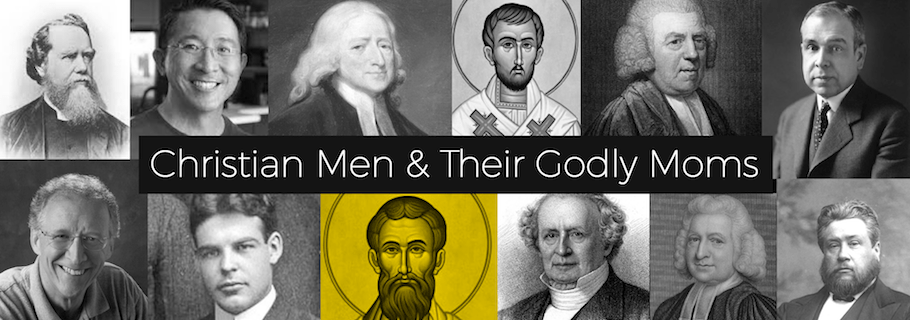In each generation, there are countless men who rise to fame because of their widespread impact. But there are only a select few who are remembered far beyond their day, who leave such a mark on the course of the world that their names are forever written in history. We know one such man as Saint Augustine of Hippo. Born Aurelius Augustinus, he was first a professor but, following a dramatic conversion, became a pastor and theologian. He is arguably the most significant of the Church Fathers and unarguably the one whose works are most familiar to us today. We cannot understand the history of Christian faith without accounting for his legacy.
We encounter Saint Augustine in the series “Christian Men and Their Godly Moms” because it is impossible to tell his story without telling about his mother. It was God’s good plan to use the patient and persistent prayers of Augustine’s mother to draw her son to faith.
Faith and Patience
Aurelius Augustinus was born on November 13, 354, in the North African municipality of Tagaste, which today is Souk Ahras, Algeria. That area of North Africa had been deeply impacted by Christianity and was the seat of much Christian fervor. Augustine was born into a family of respectable Roman citizens and received many advantages, not the least of which was a fine education. While his father, Patricius, was a pagan with a violent temper, his mother, Monica, was a Christian of godly virtue. She was a Berber and had been raised in a Christian home before she was given in marriage to the much older Patricius. She suffered deeply through his violence and adultery, but endured with faith and patience. She turned her attention to her three children and committed herself to motherhood. One biographer says, “Augustine drank of Christ with his mother’s milk … As soon as he could speak, she taught him to lisp a prayer. As soon as he could understand, she taught him, in language suited to his childish sense, the great truths of the Christian Faith.” She was his first teacher, his first instructor in Scripture and sound doctrine.
Of the three children, Augustine caused Monica the most grief. From a young age, he was rebellious and rejected both the faith and the ethics of his mother. For a time he even gave himself to hedonism, pursuing carnal pleasure and gleefully bragging of conquests both real and imagined. When he was 19, he began a relationship with a young Carthaginian woman whom his parents considered far below his station and who soon bore him a son. Though his parents continued to disapprove of his relationship, he remained with his lover for 15 years.
Patient Perseverance
When looking to ancient history it can be difficult to separate fact from legend. But we do know that Monica responded to her son’s rebellion with prayer—earnest, pleading, tear-filled prayer and fasting. One bishop who knew of Monica’s prayers comforted her by saying, “It is not possible that the son of so many tears should perish.” She prayed for Augustine and also remained close to him, accompanying him when he moved. When Patricius died, she gave herself to the service of the church, visiting the sick and mothering the orphan. Meanwhile, she continued to plead with her son to come to Christ.
In school, Augustine first distinguished himself as a brilliant student, then as a skillful teacher of rhetoric. When his career as a professor took him to Carthage and Milan, he was introduced to the cult of Manichaeism. Augustine was attracted to this dualistic system, which emphasized the struggle between spiritual good and material evil. While he was not fully inducted into this faith, he remained convinced of it for many years.
After settling in Milan, he encountered Bishop Ambrose and was immediately attracted to his intellect and his skill in answering questions about the Christian faith. Now in his early 30s, he began to wonder if Christianity could be both true and satisfying. He wondered if it offered a solution for his raging carnal desires. One day, while sitting in a garden, he heard a child chanting, “tolle, lege,” or “take up and read.” He took it as a command and found the nearest text at hand, Paul’s letter to the Romans. Immediately he read, “Let us walk properly as in the daytime, not in orgies and drunkenness, not in sexual immorality and sensuality, not in quarreling and jealousy. But put on the Lord Jesus Christ, and make no provision for the flesh, to gratify its desires” (Romans 13:13-14). He was forever transformed and was baptized the following Easter by Ambrose. Monica was there to witness the momentous event and to rejoice at the answer to so many prayers. She would die just months later, comforted by the knowledge that both her son and her husband had heard the gospel from her lips and come to Christ.
Now a Christian, Augustine was at first determined to live a monastic life until he passed through Hippo Regius and was urged by the people to be ordained. Reluctantly, he granted their request. He gave himself to preaching and writing, eventually penning voluminous works, including his Confessions and City of God, both of which are commonly read today. He served a key role in developing early Christian theology, and his writings played a particularly important role in the Middle Ages, the Protestant Reformation, and the development of Reformed Theology. Few Christians have made a deeper and longer-lasting impact on the faith. And he, of all men, knew of the great debt of gratitude he owed to his mother.
When Augustine penned his biographical Confessions, he paid tribute to her. He told how shortly after his conversion he read the Psalms for the first time and how she read them with him. He asked her for help understanding them, for “she was walking steadily in the path in which I was as yet feeling my way.” She was the one “now gone from my sight, who for years had wept over me, that I might live in [God’s] sight.” A biographical account aptly tells of her impact: “She died a happy woman for she had seen her prayers answered, and both her husband and her son had become believers. Augustine was only 33 at the time of his mother’s death, and many years of service to Christ and his church lay before him. In later years Augustine could look back on his life and recognize the importance of his mother’s perseverance in prayer to his own salvation and ministry.” Though he could run, he could never outrun his mother’s prayers.
Monica has since been canonized by the Roman Catholic Church so that today she is known as “Saint Monica.” Her devotees pray to her and venerate her relics. This is a superstitious, blasphemous abomination. Were she and her son to witness this, they would undoubtedly both be dismayed. We honor her best when we allow her life to point us to the God she so loved and served.









